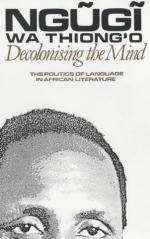
|
| Name: _________________________ | Period: ___________________ |
This quiz consists of 5 multiple choice and 5 short answer questions through Chapter 2 (Part V): "The Language of African Theatre".
Multiple Choice Questions
1. Where is the Wolof language primarily used?
(a) Algeria, Libya, and Egype.
(b) Senegal, the Gambia, and Mauritania.
(c) Sudan, Ethiopia, and Somalia.
(d) Nigeria, Niger, and Cameroon.
2. When did Ngũgĩ wa Thiong’o begin writing in Gĩkũyũ?
(a) 1975.
(b) 1982.
(c) 1973.
(d) 1977.
3. What dance is despicted in the scene from Ngaahika Ndeenda that is presented in Chapter 2, Part V?
(a) The Mwomboko dance.
(b) The Moribayasa dance.
(c) The Kpanlogo dance.
(d) The Aduma dance.
4. Who wrote the book African Language Literatures that is referred to in Chapter 1, Part VII?
(a) Amos Tutuola.
(b) Martin Carter.
(c) Albert Gerard.
(d) Birago Diop.
5. Where is the campus of Makerere University College located that the author attended a historic meeting of African writers as described in Chapter 1, Part II?
(a) London, England.
(b) Nairobi, Kenya.
(c) Cairo, Egypt.
(d) Kampala, Uganda.
Short Answer Questions
1. Who are the peasant and his wife awaiting the arrival of in the opening of Ngaahika Ndeenda?
2. When was The Black Hermit first produced?
3. When did the author submit The River Between to a writing competition by the East African Literature Bureau?
4. The author states in Chapter 1, Part IX that "to the comprador-ruling regimes, their real enemy is" what (30)?
5. Who declared in an article in Transition in 1963 that the acceptance of English and French as having no chance of advancing African literature and culture?
|
This section contains 250 words (approx. 1 page at 300 words per page) |

|




